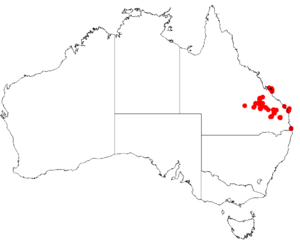Bossiaea brownii facts for kids
Quick facts for kids Bossiaea brownii |
|
|---|---|
| Conservation status | |
|
Least Concern (NCA)
|
|
| Scientific classification |
|
| Kingdom: | Plantae |
| Clade: | Tracheophytes |
| Clade: | Angiosperms |
| Clade: | Eudicots |
| Clade: | Rosids |
| Order: | Fabales |
| Family: | Fabaceae |
| Genus: | Bossiaea |
| Species: |
B. brownii
|
| Binomial name | |
| Bossiaea brownii |
|
 |
|
| Occurrence data from the Australasian Virtual Herbarium | |
| Script error: The function "autoWithCaption" does not exist. | |
Script error: No such module "Check for conflicting parameters".
Bossiaea brownii is a special kind of plant that belongs to the pea family, also known as Fabaceae. You can only find this plant growing naturally in Queensland, Australia. It's a unique part of Australia's amazing plant life!
What Does Bossiaea brownii Look Like?
This plant has small leaves called leaflets. They are shaped like an egg, but a little uneven at the bottom. Its branches are round and often covered in tiny hairs. These hairs can be long or short.
The plant's flowers have petals with pretty red or purplish marks. One part of the flower, called the keel, is about 10 mm long. It is usually not longer than another part called the standard. The stamens, which are the male parts of the flower, form a tube that stays on the plant. This tube is less than 12 mm long.
After the flowers, the plant grows pods. These pods are 15 to 40 mm long. They have sections inside and a stalk, or pod-stipe, that is 4 to 10 mm long. The plant's ovary, which holds the seeds, is smooth.
How Was Bossiaea brownii Discovered and Named?
The Bossiaea brownii plant was first officially described in 1864. A scientist named George Bentham gave it its name.
The very first sample of this plant, called the type specimen, was collected by Robert Brown. He found it on August 22, 1802, in a place called Port Clinton, Queensland.

